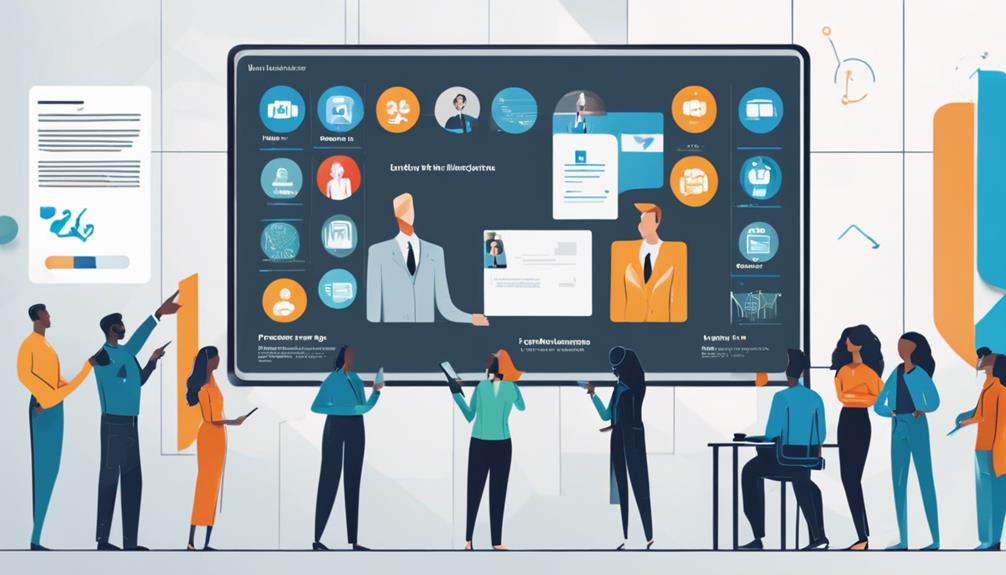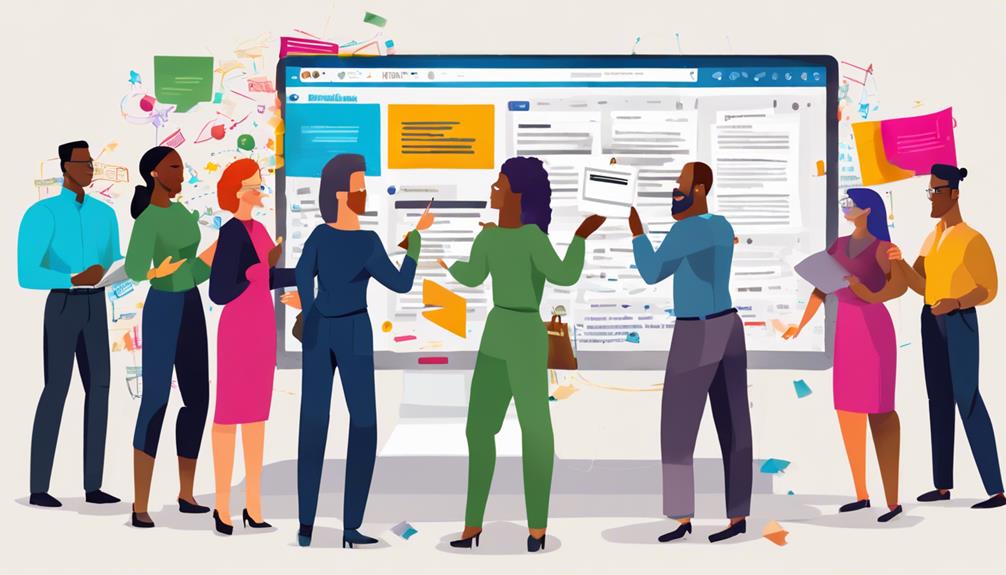
If you're looking to enhance your skills, consider leveraging LinkedIn posts more effectively. Begin by pinpointing the skills that are essential for your career growth and seek out leaders in those fields on LinkedIn. Engage with them—comment on their posts, share your views, and ask insightful questions. It's not just about passively scrolling through updates; it's about actively participating in conversations that could open new doors for you. Ever wondered how a simple comment or a shared post can dramatically boost your visibility and credibility? Let's explore how these interactions might just be the key to unlocking your full potential.
Identifying Relevant Skills

To stay competitive in your field, you need to identify the skills most relevant to your career goals. Start by analyzing job descriptions in your industry. They often list specific skills that employers find crucial.
You'll notice trends or frequent mentions of particular abilities, whether it's technical know-how, project management, or creative problem-solving.
Next, consider the trajectory of your sector. Which technologies or methodologies are emerging? Staying ahead means you're prepared for future demands, not just today's needs.
This foresight can set you apart from your peers.
You should also reflect on your personal strengths and areas for improvement. Perhaps you excel in communication but could enhance your data analysis skills.
Balancing what you're good at with what you need to improve can provide a clear direction for your skill development.
Finding Expert Content
Once you've identified the skills you need to develop, finding expert content on LinkedIn can significantly accelerate your learning. Start by using the search bar to pinpoint articles, posts, and videos that relate directly to your interests. You can refine your search by using specific keywords related to the skills you're aiming to improve. This makes it easier to sift through the abundance of content available and find what's truly relevant.
Another effective strategy is to follow companies and institutions renowned for their expertise in your field. They often share high-quality, cutting-edge insights that can help you stay updated with the latest trends and methodologies.
Don't forget to utilize LinkedIn's groups feature. Joining groups focused on your professional interests can lead you to a treasure trove of specialized content. Members frequently share expert articles, in-depth analyses, and other resources that aren't as easily accessible elsewhere.
Lastly, customize your LinkedIn feed to prioritize educational content. Adjust your settings to follow hashtags that are commonly associated with expert posts in your field. This way, you're more likely to see relevant professional content each time you log in, ensuring a steady stream of useful information right at your fingertips.
Engaging With Thought Leaders

Engaging with thought leaders on LinkedIn can elevate your professional development by providing direct access to industry insights and trends. By following and interacting with these influencers, you'll stay ahead of the curve, gaining a deeper understanding of your field's cutting-edge developments.
Start by identifying leaders whose values and career trajectories align with your aspirations. Don't just follow them; actively engage by commenting thoughtfully on their posts. Your comments should add value, perhaps by posing a relevant question or offering a unique perspective. This not only increases your visibility but also encourages a potential exchange with the thought leader themselves.
Remember, it's not about the quantity of interactions, but the quality. Thought leaders appreciate meaningful engagement over superficial comments. Such interactions can lead to deeper insights, and potentially, mentorship opportunities.
Networking with these professionals can significantly widen your professional circle. Each interaction gives you a chance to be noticed by other industry experts who follow the same thought leaders.
Over time, this network can become a crucial asset, opening doors to new opportunities and collaborations that could shape your career's trajectory.
Utilizing Interactive Features
LinkedIn's interactive features, like polls and videos, offer dynamic ways to share your expertise and engage with your network. By creating a poll, you're not just gathering opinions; you're sparking conversation and showing that you value others' input. This interaction can help you understand what topics are trending in your industry and what issues matter the most to your peers.
Don't overlook the power of video content either. Sharing a short video where you discuss a relevant topic or demonstrate a skill can dramatically boost your visibility and credibility. It's more engaging than text alone, and you can convey your passion and professionalism directly.
Remember to interact with comments on your posts. Responding to feedback or questions isn't just polite; it's an opportunity to deepen relationships and demonstrate your expertise. This direct engagement keeps the conversation going and increases the likelihood of your content being seen by a wider audience.
Lastly, don't shy away from experimenting with different types of content. Each post is a chance to refine your message and see what resonates with your audience. By actively using these features, you'll enhance your skills and expand your professional influence on LinkedIn.
Setting Learning Goals

Setting your learning goals on LinkedIn is crucial to maintaining a focused and effective professional development path. When you're clear about what you want to learn, you can better engage with content that matches your ambitions.
Start by identifying the skills most relevant to your career aspirations. Are you aiming to enhance your technical expertise or develop soft skills? Once you've pinpointed these areas, use LinkedIn to follow influencers and leaders who are pioneers in these fields.
Next, engage actively. Don't just scroll through posts; interact by asking questions or sharing insights. This interaction can lead to a deeper understanding and even attract attention from professionals who can provide guidance or opportunities.
Remember to regularly update your goals. As your career progresses, your learning needs will evolve. Revisiting and revising your objectives ensures they remain aligned with your professional journey.
It's also helpful to track your progress. Celebrate achievements to stay motivated, and don't hesitate to adjust your goals if you find they're not serving you as well as they could.
Utilizing LinkedIn for setting and achieving learning goals not only sharpens your skills but also enhances your visibility and connectivity in your professional network.
Frequently Asked Questions
How Often Should I Update My Linkedin Profile?
You should update your LinkedIn profile whenever you gain new experiences or skills. Aim for at least every six months to keep your information fresh and relevant to potential employers or connections.
Can Linkedin Posts Improve My Interview Skills?
Yes, LinkedIn posts can enhance your interview skills. By articulating your thoughts and engaging with professional content, you'll improve your communication skills and stay informed about industry trends, making you more confident in interviews.
What Is the Ideal Post Length on Linkedin?
The ideal LinkedIn post length is typically between 50-100 words. You'll engage your audience effectively without losing their attention. Keep it concise to ensure your key points are communicated clearly and quickly.
Should I Use Linkedin Premium for Skill Development?
You should consider LinkedIn Premium if you're serious about skill development. It offers advanced courses and networking opportunities that can really boost your professional growth. Weigh the costs against potential career benefits first.
Is It Necessary to Comment on Every Post?
You don't need to comment on every post. Focus on those that resonate with or inspire you to engage meaningfully. This approach will save you time and make your interactions more impactful.
Conclusion
Ready to boost your skills using LinkedIn posts? Start by pinpointing the skills you need, then dive into content from industry experts and thought leaders. Engage actively by commenting and asking questions. Don't shy away from using polls and videos to spark discussions and grow your network. Set and update your learning goals regularly, keeping pace with industry changes. Stay motivated and track your progress. With these steps, you're on your way to achieving your career aspirations!






